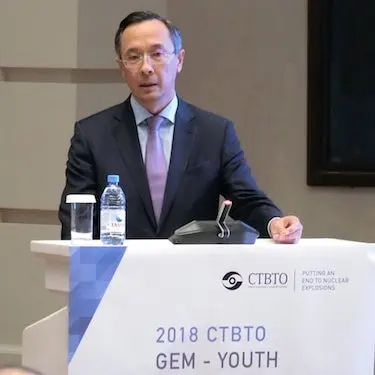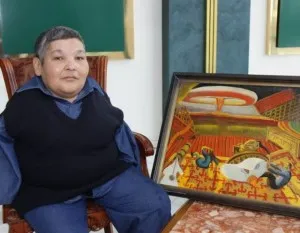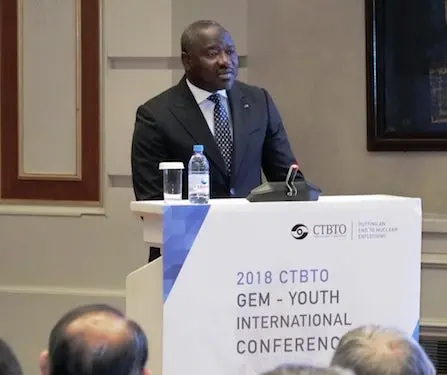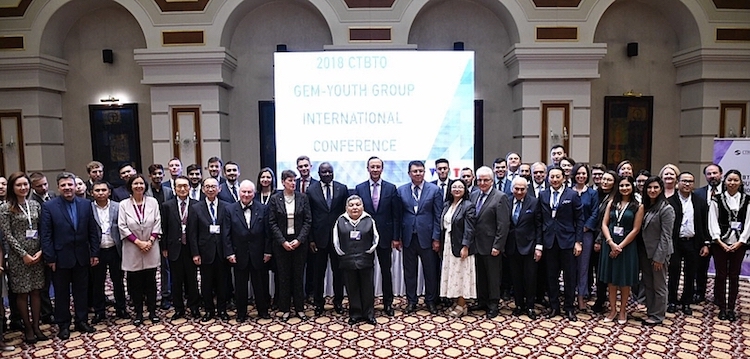By Ramesh Jaura
BERLIN | VIENNA | ASTANA (IDN) – The Kazakh Minister of Foreign Affairs Kairat Abdrakhmanov and CTBTO Executive Secretary Dr Lassina Zerbo have called on all States Signatories “to spare no effort to ensure that the nuclear test ban becomes legally binding by achieving the entry into force” of the Comprehensive Nuclear-Test-Ban Treaty (CTBT) in limbo for 22 years. JAPANESE | MALAY | NORWEGIAN
This clarion call is backed by Foreign Minister Heiko Maas of Germany, which has been elected as a non-permanent member of the Security Council for 2019-2020. In a statement issued to mark the International Day against Nuclear Tests (IDANT) on August 29, he declares: “The danger posed by nuclear weapons is particularly concrete when it comes to nuclear tests. Despite a de facto ban, these tests are unfortunately still taking place. Only one year ago, North Korea conducted its most recent nuclear test.”
Germany’s chief priority therefore continues to be fighting the proliferation of nuclear weapons and preventing nuclear tests for their further development.
“It’s clear that we need swift entry into force of the CTBT,” Maas adds. It would put in place a binding instrument of international law that universally bans nuclear tests. “We are working unstintingly to achieve this, together with our partners in Europe and elsewhere. The states that have not yet ratified and signed the CTBT should finally do so.”

In a joint statement, Kazakh Foreign Minister and Comprehensive Nuclear-Test-Ban Treaty Organization (CTBTO) Executive Secretary accentuate the historic significance of the International Day against Nuclear Tests on August 29. The UN General Assembly proclaimed the day at the initiative of the Kazakh President Nursultan Nazarbayev. They emphasize that it “is a symbolic day for Kazakhstan because of the closure of the Semipalatinsk nuclear test site [the primary testing venue for the Soviet Union’s nuclear weapons] in 1991.”
The joint statement adopted in Astana, the capital city of Kazakhstan, during the five-day 2018 Youth International Conference of the CTBTO Youth Group and the Group of Eminent Persons (GEM) – from August 28 to September 2 – also calls on all States “to continue the moratoria on nuclear test explosions,” and urges “those States that have not yet signed or ratified the Treaty to do so without delay.”
The joint statement urges in particular the remaining eight CTBT Annex 2 States, whose ratifications are needed for the Treaty’s entry into force, “to demonstrate leadership by taking this important step”.
Those States are: China, Egypt, India, Iran, Israel, North Korea, Pakistan and the USA. India, North Korea and Pakistan have yet to sign the CTBT. Altogether 183 countries have signed the CTBT, of which 166 have also ratified it, including three of the nuclear weapon States: France, the Russian Federation and the United Kingdom. But 44 specific nuclear technology holder countries must sign and ratify before the CTBT can enter into force.
The Astana joint statement reaffirms the commitment of Kazakhstan and the CTBTO to realizing a world free of nuclear testing and renews their resolve to achieve the entry into force of the CTBT.
“For the last 22 years the CTBT has been a beacon of hope,” Foreign Minister Abdrakhmanov said in an opening address to the Conference. “However, as stated recently by the UN Secretary General global peace yet remains elusive. Lack of common political will is the main obstacle on our path towards a nuclear free world.”

He drew attention to the fact that High-level Plenary Meeting of the UN General Assembly will convene in New York on September 6 to commemorate the International Day Against Nuclear Tests.
Global security and a safe future for coming generations can only be guaranteed when the world is completely free from the nuclear weapons, he said. The ATOM (stands for: Abolish Testing is Our Mission) Project and its Honorary Ambassador and artist Karipbek Kuyukov have done a lot in this regard.
“As a step further we encourage states to pledge their support to the Treaty on the Prohibition of Nuclear Weapons,” the Kazakh Foreign Minister said. Kazakhstan signed the Treaty on March 2, 2018 and is currently preparing for its ratification.
“Our future is in the hands of youth. Your valuable contribution and active involvement will be helpful at raising further public awareness of the dangerous consequences of the use of nuclear weapons,” he added.
IDANT was commemorated around the world on August 29 with events taking place at the United Nations in New York and Vienna, as well as in Astana. The highly symbolic date marks both the anniversary of the first Soviet nuclear test in 1949 and the closure of the Semipalatinsk nuclear test site. In the intervening years, 456 tests were carried out at that site, with devastating consequences. Globally, more than 2050 nuclear tests were carried out between 1945 and 1996.

A historic decision to close the Semipalatinsk testing site, which was made by the Kazakh President on August 29, 1991, sent a strong political message and contributed to the international efforts that led to the adoption of the CTBT in 1996, says the joint statement.
Over the years, the joint statement adds, Kazakhstan has provided strong support for the CTBTO and demonstrated determination to achieve the elimination of nuclear weapons. In 2008, the CTBTO held the first large-scale on-site inspection (OSI) integrated field exercise in Semey, until 2007 known as Semipalatinsk. In 2015-2017 Kazakhstan, together with Japan, сo-chaired the CTBT Article XIV Process to facilitate speedy entry into force of the Treaty.
“Kazakhstan, as a non-permanent member of the UN Security Council for 2017-2018, is tirelessly supporting international efforts aimed at strengthening the global nuclear non-proliferation regime, highlighting the danger that nuclear weapons pose to global peace and stability,” notes the statement.
CTBTO’s Dr Zerbo said the CTBT is “a confidence-building element, ensuring that no nuclear test goes undetected, a common denominator for NNWS [non-nuclear weapon states] and NWS [nuclear weapon states] and a solid basis for continuing dialogue and expanding cooperation”.

In a statement distributed from Vienna, Dr Zerbo – who returned a few days earlier from a visit to the Republic of Korea, where he discussed the situation of Korean Peninsula with many senior officials and members of the civil society – said: “The discussions that I had strengthened my conviction that the CTBT and its organization can play an important role in finding a lasting solution to the nuclear problem on the Korean Peninsula.”
The Treaty and its verification regime, as well as the expertise and capabilities of the Commission, are all the more relevant to contribute to the process of denuclearization of the Korean Peninsula, he added.
At its headquarters in Vienna, CTBTO together with the Permanent Mission of Kazakhstan – supported by the United Nations Information Service – organised an exhibit and commemorative event for members of the diplomatic community, staff of the Vienna-based International organizations and civil society.
On that occasion, the CTBTO and Peace and Cooperation (a Spanish NGO), jointly launched the 2018 Global Scholar Art Campaign “For a Safer World–Join Forces with the CTBTO”. This campaign will engage school children around the world to increase public awareness of the need to put an end to nuclear testing and culminate in an awards ceremony and art exhibition at the CTBTO 2019 Science and Technology Conference. [IDN-InDepthNews – 30 August 2018]
Related comment: Secretary-General’s Message on International Day Against Nuclear Tests
Photo: Participants of the 2018 CTBTO GEM – Youth International Conference in Astana. In the front is ATOM Project leader, Honorary Ambassador and artist Karipbek Kuyukov. Behind him: Kazakh Foreign Minister Kairat Abdrakhmanov (on the right) and CTBTO Executive Secretary Dr Lassina Zerbo (on the left). Credit: CTBTO. | Photos of Kazakh Foreign Minister Abdrakhmanov and Dr Zerbo in the text are by Katsuhiro Asagiri, IDN-INPS Multimedia Director.




